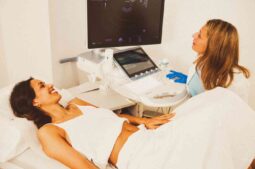The embryo transfer is one of the most exciting and anticipated moments during fertility treatment. After the procedure, many women wonder if they can resume their normal daily activities, with one of the most common concerns being whether it is safe to travel during this delicate period.
This article explores whether it is possible to travel after embryo transfer, the precautions you should take, and medical recommendations for traveling by car or plane. Additionally, we will address traveling during pregnancy, as embryo transfer is a critical milestone in the reproductive process that could lead to the much-desired pregnancy. Read on to learn everything you need to know about this topic.
Traveling After Embryo Transfer
Embryo transfer is the process by which fertilized embryos are placed into the woman’s uterus, hoping that they will implant and lead to pregnancy. Although this is a relatively simple and non-invasive procedure, many women have concerns about traveling shortly afterward.
In general, traveling after an embryo transfer is usually considered safe. Most fertility specialists agree that there is no scientific evidence to suggest that traveling by car or plane immediately after the transfer increases the risk of implantation failure or causes harm. However, it is essential to keep the following considerations and precautions in mind:
- Stress and Fatigue: Stress and fatigue can affect your overall well-being. Since your body is in a delicate phase after the transfer, it is advisable to avoid situations that could cause anxiety, such as long or exhausting trips.
- Consult Your Doctor: Always consult your gynecologist or fertility specialist before deciding to travel. They can provide personalized guidance based on your medical history and the specific type of treatment you have undergone.
- Avoid Intense Physical Effort: While traveling does not involve extreme physical activity, it is crucial not to overburden your body with strenuous activities immediately after the transfer.
Traveling by Car After Embryo Transfer
Traveling by car after an embryo transfer generally poses no risks to the pregnancy if you follow certain recommendations. Car trips are often more manageable than flights, as they allow you to rest when needed and maintain control over travel conditions. Here are some tips:
- Avoid Long Trips: Although traveling by car is not contraindicated, it is best to avoid long trips that could cause discomfort or excessive fatigue. For extended journeys, take frequent breaks to stretch your legs and move around. This helps improve circulation and reduces the risk of blood clots.
- Stay Hydrated and Comfortable: During your trip, staying hydrated is essential for reproductive health. Carry water and healthy snacks to avoid fatigue. Also, wear loose-fitting clothing, especially around the abdominal area, to ensure maximum comfort.
- Avoid Sudden Movements: If you feel dizzy or uncomfortable, take a break and rest in a comfortable position. Avoid sudden or jerky movements and prioritize your physical and emotional well-being during this period.
Traveling by Plane After Embryo Transfer
Air travel is another concern for many women after an embryo transfer. While there is no evidence that flying negatively affects embryo implantation, it is important to consider the following factors before boarding a flight:
- Atmospheric Pressure: Although airplanes are pressurized, altitude changes may slightly affect the body’s oxygenation. For most women, this poses no risk, but if you have complications with your treatment or your doctor has advised caution, follow their guidance.
- Risk of Deep Vein Thrombosis (DVT): DVT is a concern during long flights, especially if you remain seated for extended periods. To minimize this risk, walk around the cabin periodically or perform foot flexion and extension exercises while seated. Wearing loose clothing and avoiding tight garments around the legs can also improve circulation.
- Avoid Long Flights: choose direct flights to minimize layovers and unnecessary waiting times. For extended travel durations, consult your doctor about any potential risks.
- Consult Your Doctor: If you have medical issues related to fertility or your treatment has been complicated, it is best to consult your gynecologist before flying. Your doctor can provide tailored advice about the safety of air travel after embryo transfer.
Can I Travel While Pregnant?
Once you achieve pregnancy following embryo transfer, traveling becomes a different type of concern. It is natural for women who conceive through fertility treatments to wonder if it is safe to travel during pregnancy.
In general, traveling while pregnant is safe, but precautions should be tailored to the stage of pregnancy. Most specialists recommend traveling with caution during the first three months and the final weeks of pregnancy.
Traveling While Pregnant
- First Trimester: During the first trimester, many women experience nausea, fatigue, and other discomforts. Although traveling by car or plane is not inherently dangerous, it is important to prioritize comfort. If symptoms like vomiting or dizziness are severe, consider postponing travel until you feel better.
- Second Trimester: The second trimester is often considered the best time to travel, as many women feel more energetic, and the risk of complications is lower. Long trips are generally safe during this stage, provided you follow your doctor’s recommendations.
- Third Trimester: Travel can become more challenging in the third trimester, especially after 28 weeks of gestation, due to the increased size of the abdomen and the risk of preterm labor. Most airlines restrict travel after 36 weeks and may require a medical certificate for travel after 28 weeks.
Reasons to Avoid Traveling While Pregnant
Although most women can travel safely during pregnancy, certain conditions may necessitate avoiding travel:
- High-Risk Pregnancy: If your pregnancy is classified as high-risk, such as in cases of prior miscarriage, high blood pressure, gestational diabetes, or cervical problems, avoid travel, especially in late pregnancy stages.
- Pregnancy Complications: If you experience bleeding, abdominal pain, or any concerning symptoms, consult your doctor before considering any type of travel.
- Limited Access to Medical Care: If traveling to remote destinations or outside your country, ensure that quality medical care is accessible in case of emergencies.
Can I Go to the Beach While Pregnant?
The beach is a popular vacation destination, but many women wonder if it is safe to visit the beach during pregnancy. The answer depends on your health and the stage of pregnancy.
- Avoid Excessive Sun Exposure: Pregnancy increases skin sensitivity, so it is important to limit sun exposure. Use appropriate sunscreen and stay hydrated if you decide to visit the beach.
- Avoid Extreme Temperatures: High heat increases the risk of dehydration and overheating, so take frequent breaks in shaded areas and stay cool.
- Water Safety: Ensure the water is clean and free from contaminants if you plan to swim. Avoid risky activities such as swimming in rough waters or strong currents.
Traveling after embryo transfer or during pregnancy is generally safe, but prioritizing your well-being and following medical recommendations is essential. Although traveling by car or plane typically does not pose significant risks after embryo transfer, always consult your doctor before making plans. Similarly, if you are pregnant, take precautions based on your trimester and health status.
Listen to your body, adjust as necessary, and ensure that your travel plans do not compromise your or your baby’s health.





Comments are closed here.